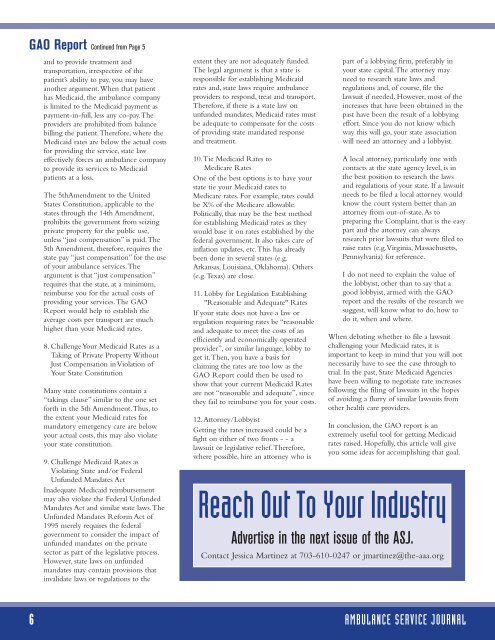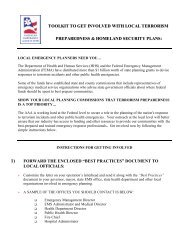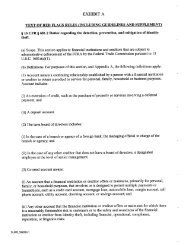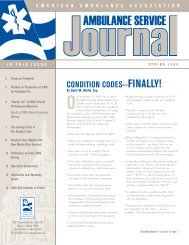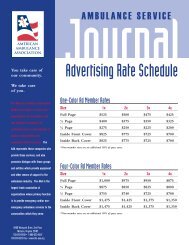Summer 2007 - American Ambulance Association
Summer 2007 - American Ambulance Association
Summer 2007 - American Ambulance Association
You also want an ePaper? Increase the reach of your titles
YUMPU automatically turns print PDFs into web optimized ePapers that Google loves.
GAO Report Continued from Page 5<br />
and to provide treatment and<br />
transportation, irrespective of the<br />
patient’s ability to pay, you may have<br />
another argument.When that patient<br />
has Medicaid, the ambulance company<br />
is limited to the Medicaid payment as<br />
payment-in-full, less any co-pay.The<br />
providers are prohibited from balance<br />
billing the patient.Therefore, where the<br />
Medicaid rates are below the actual costs<br />
for providing the service, state law<br />
effectively forces an ambulance company<br />
to provide its services to Medicaid<br />
patients at a loss.<br />
The 5thAmendment to the United<br />
States Constitution, applicable to the<br />
states through the 14th Amendment,<br />
prohibits the government from seizing<br />
private property for the public use,<br />
unless “just compensation” is paid.The<br />
5th Amendment, therefore, requires the<br />
state pay “just compensation” for the use<br />
of your ambulance services.The<br />
argument is that “just compensation”<br />
requires that the state, at a minimum,<br />
reimburse you for the actual costs of<br />
providing your services.The GAO<br />
Report would help to establish the<br />
average costs per transport are much<br />
higher than your Medicaid rates.<br />
8. Challenge Your Medicaid Rates as a<br />
Taking of Private Property Without<br />
Just Compensation in Violation of<br />
Your State Constitution<br />
Many state constitutions contain a<br />
“takings clause” similar to the one set<br />
forth in the 5th Amendment.Thus, to<br />
the extent your Medicaid rates for<br />
mandatory emergency care are below<br />
your actual costs, this may also violate<br />
your state constitution.<br />
9. Challenge Medicaid Rates as<br />
Violating State and/or Federal<br />
Unfunded Mandates Act<br />
Inadequate Medicaid reimbursement<br />
may also violate the Federal Unfunded<br />
Mandates Act and similar state laws.The<br />
Unfunded Mandates Reform Act of<br />
1995 merely requires the federal<br />
government to consider the impact of<br />
unfunded mandates on the private<br />
sector as part of the legislative process.<br />
However, state laws on unfunded<br />
mandates may contain provisions that<br />
invalidate laws or regulations to the<br />
extent they are not adequately funded.<br />
The legal argument is that a state is<br />
responsible for establishing Medicaid<br />
rates and, state laws require ambulance<br />
providers to respond, treat and transport.<br />
Therefore, if there is a state law on<br />
unfunded mandates, Medicaid rates must<br />
be adequate to compensate for the costs<br />
of providing state mandated response<br />
and treatment.<br />
10.Tie Medicaid Rates to<br />
Medicare Rates<br />
One of the best options is to have your<br />
state tie your Medicaid rates to<br />
Medicare rates. For example, rates could<br />
be X% of the Medicare allowable.<br />
Politically, that may be the best method<br />
for establishing Medicaid rates as they<br />
would base it on rates established by the<br />
federal government. It also takes care of<br />
inflation updates, etc.This has already<br />
been done in several states (e.g.<br />
Arkansas, Louisiana, Oklahoma). Others<br />
(e.g.Texas) are close.<br />
11. Lobby for Legislation Establishing<br />
"Reasonable and Adequate" Rates<br />
If your state does not have a law or<br />
regulation requiring rates be “reasonable<br />
and adequate to meet the costs of an<br />
efficiently and economically operated<br />
provider”, or similar language, lobby to<br />
get it.Then, you have a basis for<br />
claiming the rates are too low as the<br />
GAO Report could then be used to<br />
show that your current Medicaid Rates<br />
are not “reasonable and adequate”, since<br />
they fail to reimburse you for your costs.<br />
12.Attorney/Lobbyist<br />
Getting the rates increased could be a<br />
fight on either of two fronts - - a<br />
lawsuit or legislative relief.Therefore,<br />
where possible, hire an attorney who is<br />
part of a lobbying firm, preferably in<br />
your state capital.The attorney may<br />
need to research state laws and<br />
regulations and, of course, file the<br />
lawsuit if needed. However, most of the<br />
increases that have been obtained in the<br />
past have been the result of a lobbying<br />
effort. Since you do not know which<br />
way this will go, your state association<br />
will need an attorney and a lobbyist.<br />
A local attorney, particularly one with<br />
contacts at the state agency level, is in<br />
the best position to research the laws<br />
and regulations of your state. If a lawsuit<br />
needs to be filed a local attorney would<br />
know the court system better than an<br />
attorney from out-of-state.As to<br />
preparing the Complaint, that is the easy<br />
part and the attorney can always<br />
research prior lawsuits that were filed to<br />
raise rates (e.g.Virginia, Massachusetts,<br />
Pennsylvania) for reference.<br />
I do not need to explain the value of<br />
the lobbyist, other than to say that a<br />
good lobbyist, armed with the GAO<br />
report and the results of the research we<br />
suggest, will know what to do, how to<br />
do it, when and where.<br />
When debating whether to file a lawsuit<br />
challenging your Medicaid rates, it is<br />
important to keep in mind that you will not<br />
necessarily have to see the case through to<br />
trial. In the past, State Medicaid Agencies<br />
have been willing to negotiate rate increases<br />
following the filing of lawsuits in the hopes<br />
of avoiding a flurry of similar lawsuits from<br />
other health care providers.<br />
In conclusion, the GAO report is an<br />
extremely useful tool for getting Medicaid<br />
rates raised. Hopefully, this article will give<br />
you some ideas for accomplishing that goal.<br />
Reach Out To Your Industry<br />
Advertise in the next issue of the ASJ.<br />
Contact Jessica Martinez at 703-610-0247 or jmartinez@the-aaa.org<br />
6<br />
AMBULANCE SERVICE JOURNAL


